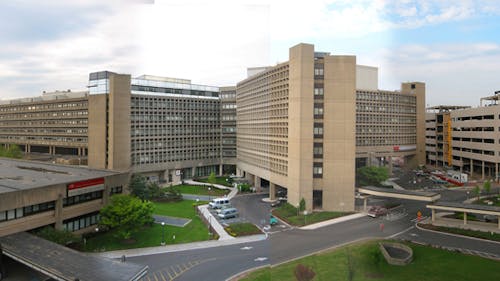NJMS receives nearly $4 million to research links to lung disease

Last month, researchers at Rutgers New Jersey Medical School (NJMS) received nearly $4 million from the National Institutes of Health to research how previous infections affect lung disease, according to an article from Rutgers Today.
Mark Siracusa, an associate professor at the Center of Immunity and Inflammation and the Department of Medicine at NJMS, said the grant was a multi-group grant split up between various collaborators.
He said that the grant took five to six years of collaboration along with finding similarities between the different groups' research to create a more well-rounded understanding of pulmonary illnesses, strengthening their proposal.
"The large focus of the grant is trying to understand how previous exposure to any kind of pathogen changes your subsequent reactivity to a different signal," he said.
Siracusa said that his research included an understanding of how the body dealt with past infections and adapted for the future and the mechanistic triggers that governed these outcomes.
"If a pathway is turned on early on, and we find that results in a detrimental outcome later on, could we shut that pathway off to be able to promote a more optimal outcome to a subsequent pulmonary infection?" he said.
Siracusa said that they were looking at how eliminating these medical pathways in animal models changed the outcome when it was given an infection.
William Gause, a professor in the Department of Medicine and the director of the Institute for Infectious and Inflammatory Diseases at NJMS, said that his research involved monitoring the immune response in the lungs of mice during infectious disease.
Gause, who is also the director of the Center for Immunity and Inflammation and one of the collaborating immunology researchers, said that the experiments involved infecting mice with helminths, intestinal parasitic worms and fungi, and then with various diseases and assessing their lungs, lung function and the immune response.
Gause said that this could shed light on the variation in how people respond to different viral infections, like coronavirus disease (COVID-19), during which some individuals experience severe symptoms and others have milder ones.
"We think part of this might be a result of their previous environmental exposures," he said. "Genetics certainly play a role, but on top of that is the environment in which they have previously been exposed to."
Gause said that he and his fellow researchers may see the effect of exposure to fungi or the helminths in the mice's response to viruses.
He said he hopes to discover the specific pathogens that promote resistance to these viruses and identify the cell types or molecules responsible for this protection.
"If we can identify them, this gives us potential targets for new therapeutics for treating these infections, and also, they provide the basis for next-generation vaccines," he said.
Siracusa said that in the future, he wants to research the link between a person's medical history and their potential risks. He said he wants to incorporate this understanding into how clinicians treat patients.
Siracusa said that in addition to a patient's age and genetic background, doctors could look at their medical records to map their possible future infections and diseases.
"I'd like people to know that we're not just limited to the basic research, that a lot of us are really even trying to advance the therapeutic side of things," Siracusa said. "I think there are practical applications of trying to drive this, take it further out, to get it to be able to help people and be able to treat people for various disease states and inflammatory disorders."



